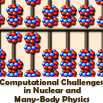Speaker
Yasuyuki Suzuki
Description
Explicitly correlated Gaussian basis is used for solving
few-body problems in many fields. The basis functions are
easily adaptable and flexible enough to describe complex
few-body dynamics. We obtain a unified description of
different types of structure and a fair account of
correlated motion of interacting particles as well as the
tail of the wave function. I present some examples that show
the power of the correlated Gaussians: The bound and
resonant states of 4He, the electric dipole response
functions of 4He and 6He, and alpha-clustering in 16O in the
framework of a 12C core plus four nucleon model.
It is a challenge for future to extend the application of
the correlated Gaussians to a study on a competition between
single-particle motion and clustering around a non-inert
core. Such a study will be important to evaluate the rate of
the radiative capture reactions 12C(alpha, gamma)16O at low
energy and to account for the low-lying spectrum of 212Po
that shows the large alpha-decay width and the enhanced
electric dipole transitions.

